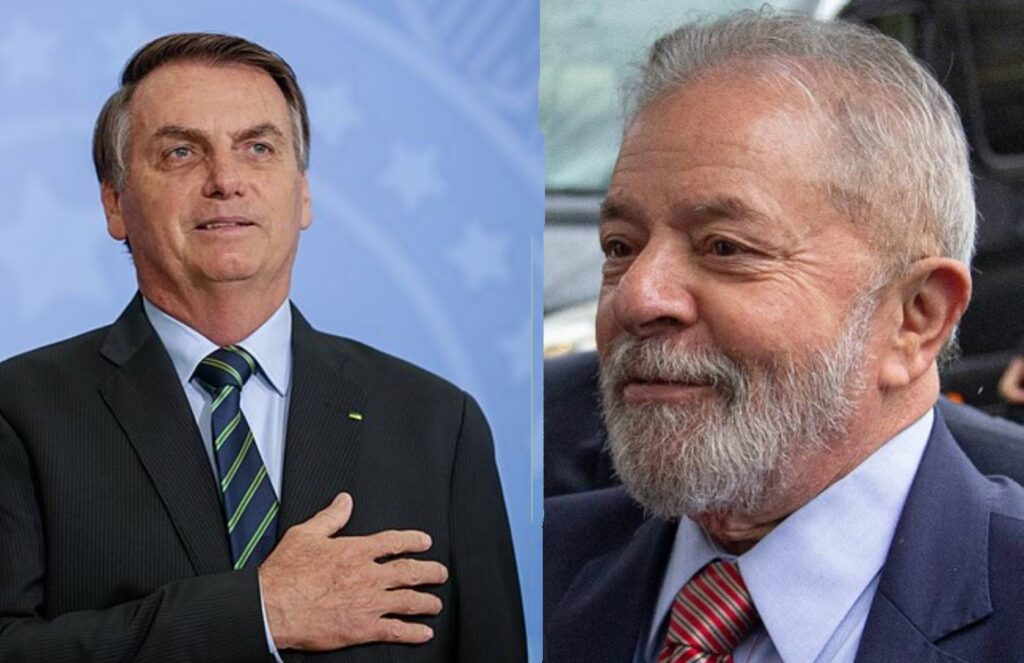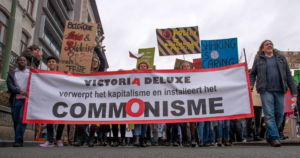Lula’s first-round victory is encouraging, but Bolsonaro’s surprisingly strong result means four anxious weeks lie ahead.
Nothing is decided yet. Brazil’s former president Luiz Inácio “Lula” da Silva won the first round of the presidential election last Sunday with a clear lead, but failing to achieve an absolute majority, the centre-left politician will face off against far-right president Jair Bolsonaro in a second round in 30 October. For Brazilians, this means another four weeks of anxiety and expectations, speculation about voting trends and the impact of fake news, and fear of instability or even a coup should the election lead to a transfer of power.
Nearly 48.5 percent for Lula represents a clear victory. The result confirms polling numbers that indicated the left-wing coalition candidate was the clear favourite for many months. More surprising is Bolsonaro’s performance, taking in 43.2 percent of the votes despite polls placing him at around 36 percent. Lula’s advantage is thus only 5 percent, or roughly 6 million votes. Lula was nevertheless optimistic on election night, stating: “We will win this election, today’s result is nothing more than an extension.”
The other candidates all received totals in the low single digits. Third place was taken by the so-called “Third Way” candidate of the traditional right-wing parties, Senator Simone Tebet of the Brazilian Democratic Movement (MBD). Fourth place was filled by Ciro Gomes of the centre-left Democratic Labour Party (PDT). Despite being politically fairly close to Lula’s Workers’ Party (PT), and even occupying a minister position during his first term beginning in 2003, he tried unsuccessfully to raise his own profile by launching vicious attacks against the PT stalwart.
For Bolsonaro, his vocal supporters, and the parties backing his government, the election result marks a success in the sense that that the incumbent won significantly more votes than polls predicted. Particularly in the most populous state, São Paulo, and also in the important city of Rio de Janeiro, the polling institutes — as was also the case in the US and other parts of the world — evidently failed to fully reflect right-wing populist candidate’s broad support.
Clean Elections, Dubious Claims
Bolsonaro’s strong showing had a negative impact on the mood among Lula’s supporters, who had hoped for a first-round victory. In addition, results from ballot boxes across Brazil came in faster from richer districts and regions on election night than from poorer ones, especially from Lula’s strongholds in the northeast. This meant that Bolsonaro was in the lead for hours during the count, and Lula only caught up to him after exactly 70 percent of the ballots had been counted. As a result, joy over his nevertheless clear election victory began to feel more like relief.
Despite the mixed feelings, there were victory celebrations for the PT in numerous cities. In São Paulo, Lula and other PT luminaries were present on Avenida Paulista. The riots or attacks by Bolsonaro supporters which were feared in the event of a Lula victory did not occur, at least during the course of the night. According to the Superior Electoral Court, election day also passed throughout the country without any significant incidents.
The doubts concerning a smooth election process were mainly fuelled by Bolsonaro himself. Until the end he had claimed, contrary to all predictions, that he would certainly win in the first round of voting. He repeatedly criticized the electoral system and especially the electronic ballot boxes, which he claimed were a gateway for electoral fraud. That is also why, like his American role model Donald Trump, he refused to say whether he would accept defeat at the polls until the end.
The controversial right-wing populist repeatedly declared that a transfer of power would occur “only after clean elections”. His political entourage has repeatedly said that he would secure his grip on power in the streets and by force if necessary.
The fact that Bolsonaro did not repeat such threats on election night may well be due to his surprising result and his coalition’s solid performance. Nevertheless, many fear that Bolsonaro will question Lula’s strong showing in the coming weeks in order to bolster his claim that the elections were rigged should his opponent win on 30 October.
What will happen after that is pure speculation. A coup in the classical sense and with the participation of the military is considered unlikely, as there would be too much resistance both in the country and internationally. But tangible, violent unrest or targeted attacks against political opponents cannot be ruled out — especially since Bolsonaro relaxed Brazilian gun laws during his four years in office and tens of thousands of his supporters are now armed. Moreover, the police and especially the military police, which already have a bad reputation due to their often brutal actions, are among the strongest supporters of Bolsonaro, himself a former military officer.
The congressional elections saw few surprises. The Senate and the Parliament, both of which were dominated by conservatives over the past four years, will remain so in the coming legislative term. However, the far-right parties from Bolsonaro’s camp were able to expand their influence. Bolsonaro’s own Liberal Party (PL), for example, was able to almost double its Senate seats and will be the strongest group in the future. Parties from the left-wing spectrum were able to either maintain or slightly increase their seats. Guilherme Boulos of the far-left Socialism and Liberty Party (PSOL), an important political partner of the Rosa Luxemburg Foundation, was particularly successful, becoming the most-voted federal deputy in the state of São Paulo with over 1 million votes.
Overall, a parallel to the polarized duel for the presidency is emerging in Congress: the forces of the centre and the traditional right-wing parties lost out in favour of the radical right, which gained more and more ground. Meanwhile, the Left is moving towards the centre to prevent losses.
Governors were also elected in the 26 states and the capital, Brasilia. As expected, especially in the rather poor northeast, candidates belonging to Lula’s left-wing camp mostly prevailed. In the richer south or west, right-wing candidates tended to come out on top.
An exact classification is often not possible, because different party coalitions are formed in many regions than at the federal level. For example, the clear winner in the northern state of Pará, Helder Barbalho, is a member of Tebet’s MDB, but made no secret of his sympathy and support for Lula during the election campaign. That said, many governors will only be decided after the second round of voting is held in the states.
Probably the second-most-important election after the presidency took place in the populous and industrial state of São Paulo, where Lula’s party faced its biggest disappointment. The PT candidate for governor, Fernando Haddad, came second with just under 36 percent, although polls put him clearly in the lead. His opponent in the second round is Bolsonaro supporter Tarcísio de Freitas, who surprisingly took in almost 42 percent of the vote. The incumbent Rodrigo Garcia came third, illustrating that the traditional, pro-business Right has lost its decades-long dominance in São Paulo state.
Also noteworthy is the result in the state of Rio de Janeiro, the home of the incumbent president. Contrary to predictions, his confidant and former governor Cláudio Castro was able to seal his re-election in the first round with 58.7 percent of the vote, well ahead of the left-wing politician Marcelo Freixo’s 27.4 percent.
Nothing Is Certain
Lula da Silva’s victory in the first round of voting is undoubtedly a success — both for the Left and for democratic Brazil — and a good starting point for the second round on 30 October. But if the predicted 36 percent of the vote for a right-wing extremist with such an undemocratic and condescending style of government was already somewhat intimidating, his result of over 43 percent is simply frightening. Regardless of the name of the future president, Latin America’s largest country must prepare for rough times ahead. Even if Lula wins as expected, the political headwind is already being felt.
Bolsonaro and his radical supporters will remain present, both on the streets, in public debates, and above all in Congress. The fact that the political centre, or the former moderate Right, is growing weaker and weaker cements social polarization, which in turn plays into the hands of the right-wing radicals.
Lula’s PT and its allies will have a hard time building majorities for their policies after a possible election victory. This means that it will be difficult for Lula to roll back Bolsonaro’s mistakes and fatal policy decisions in the environmental, economic, and social spheres.
Lula succeeded in creating a broad coalition of opinion from the far-left to well into the right wing of the political spectrum and also in business circles in the run-up to the elections. The consensus was and is by no means support for Lula, the PT or its political line, but rather explicit rejection of Bolsonaro, his political aims, his derogatory language targeting minorities, his international isolation, and the questioning of democratic institutions. This broad opposition strategy is Lula’s most important pledge in the second round, but the 54 percent predicted for 30 October are not a safe lead over an opponent who does not hesitate to enlist the government apparatus in his election campaign and who is expected to launch manipulative fake news campaigns on social networks at any time, as he did four years ago.
Although around a third of voters for the third- and fourth-place candidates Tebet and Gomes said in surveys that they would vote for Lula in the second round, Bolsonaro’s prospects are better now than before 3 October, given the new momentum he will take from his surprisingly good result.
Originally published on the website of the Rosa-Luxemburg-Stiftung.
Cover photo: Luiz Inácio Lula da Silva (right) in Karl-Liebknecht-Haus in Berlin 10 March 2020, by Martin Heinlein / DIE LINKE via Flickr. License CC-BY-2.0. Jair Bolsonaro (left) during a ceremony in Brazil 4 March 2020, by Carolina Antunes via Flickr, license CC-BY-2.0.



